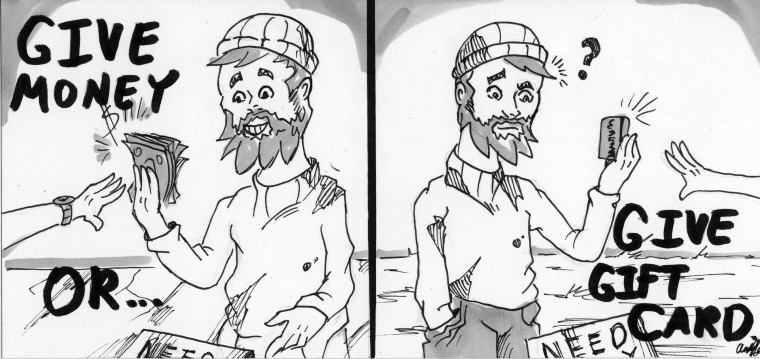Panhandlers: Just give them the money
September 1, 2010
Logan Short cautions against giving panhandlers money, for some may use it for drugs. Mr. Short also states that you should get to know the person behind the pale. Mr. Short has fallen short.
Mr. Short advises that instead of money, give those in need food, gift cards and things of that nature. However, a human can only eat three times a day, and everyone needs money.
Take for example Tony Heilmann, who many of us have seen standing by Walmart asking for work and selling suckers. Tony stays at the Travelodge at 1116 W. Lincoln Highway. Tony cannot trade gift cards for his daily bill of $36. Tony also has other expenses such as laundry, storage and insurance. As much as McDonald’s would like, Tony cannot pay those bills with burgers.
Mr. Short’s remedy is to go to the hotel and pay for his room. I assume that Mr. Short would continue that logic and say write a check for his insurance and mail it in. That would be a great idea if we all had hours of our day free, but we do not.
What is wrong with giving someone in need money? Oh, it is your money and you want it spent accordingly. Yeah, some of those in need will use money given to them to cause harm to themselves. However, that harm inflicted is far less than the harm created by Mr. Short’s vainglorious attempt to seem charitable, for within lies stereotypes and misconception.
The stereotype is that those who cannot support themselves did something wrong to be in the situation they are in. Tony did not do anything wrong, except work for an employer who did not pay into his unemployment. This stereotype is a slippery slope that ends in ignoring those in need entirely.
Mr. Short counters that if you take time to get to know the person, the threat of neglecting those who deserve help would be diminished. Unfortunately, for those from or going to big cities, that task is impossible.
And that is where Mr. Short’s misconception of charity comes in. Charity is giving what you can out of the kindness of your soul without moral judgments. Charity is the belief that one day they will see the light or get the break they need, but until then, this small gift is all you can do to minimize their suffering. Charity is not, “I will help you if…”
My charity to Tony Heilmann is letting you get to know him. Even though that is not possible in big cities, it is certainly possible in DeKalb.
Aaron Brooks: Why do you give people candy?
Tony Heilmann: I give people candy because I do not want to sit and beg. I want to have something to offer them.
AB: Do people give you a lot of money?
TH: People do not have too much, it is hard times. I talk to people all the time who do not have money, but I still give them candy.
AB: How long do you stand here and sell candy?
TH: I stand out here as long as it takes me to pay my rent and get something to eat, then I call it quits. I do not want to be greedy.
AB: Some people may not want to give you money because they think you will spend it on drugs. What do you say to that?
TH: I do not know. They got to make up their mind about that; I cannot answer that for them. I know who I am, and I know that I am not a bad person.







